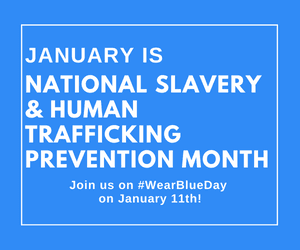
During January, National Slavery and Human Trafficking Prevention Month, we encourage you to learn more about human trafficking, a grievous crime that results in severe human rights violations.
Human trafficking, a contemporary form of slavery, occurs when a trafficker uses force, fraud, or coercion to control another person, compelling them to engage in commercial sex acts or solicit labor or services against their will.
This crime often intersects with domestic violence, taking various forms, as outlined by Freedom Network USA, a coalition of experts and advocates fighting human trafficking in the US. These intersections include cases where traffickers are also domestic violence offenders, exploit a victim's history of abuse to perpetrate further harm, or use prior victimization to intimidate and control individuals. The convergence of domestic violence and human trafficking can also impact a victim's ability to trust institutions and people in general.
In New York State (NYS), sex trafficking and child sex trafficking are both classified as class B felonies. Recent legislation in 2022 builds upon existing laws since 2018, addressing various aspects of human trafficking awareness and survivor support. The recent new laws include requirements for informing human trafficking victims about available online information, displaying posters in businesses with on-premises alcoholic beverage licenses, and posting information about services for human trafficking victims in various public spaces.
Despite these legislative efforts, there is an ongoing need to raise awareness and support for victims of human trafficking. Everyone can contribute by learning to recognize the signs of human trafficking, including indicators of abuse, underpayment or non-payment, excessive working hours, and dangerous working conditions. Specific red flags also include individuals being unable to leave home or work premises, lacking personal documents, and underage individuals working in the commercial sex industry.
To further support the cause, individuals can participate in #WearBlueDay on January 11th, wearing blue to show solidarity and raise awareness of modern slavery. Participants are encouraged to take a selfie and use the hashtag #WearBlueDay to spread the word.
To deepen your understanding of human trafficking and its intersections with domestic violence, consider exploring the following resources:
- National Human Trafficking Hotline: What is Human Trafficking?
- Polaris: Recognizing Human Trafficking
- Administration for Children & Families Office on Trafficking in Persons: National Human Trafficking Training and Technical Assistance Center (NHTTAC)
- Freedom Network: Human Trafficking and Domestic Violence
- The Human Trafficking Legal Center: Human Trafficking and Domestic Violence Fact Sheet
- Center for Abuse Prevention: Human Trafficking Awareness Month Toolkit
[1] Freedom Network USA. (2015). Human Trafficking and Domestic Violence.https://freedomnetworkusa.org/app/uploads/2016/12/HT-and-Domestic-Violence.pdf
[2] Freedom Network USA. What Are the Signs of Trafficking? https://freedomnetworkusa.org/the-issue/ Accessed 15 December 2020.


